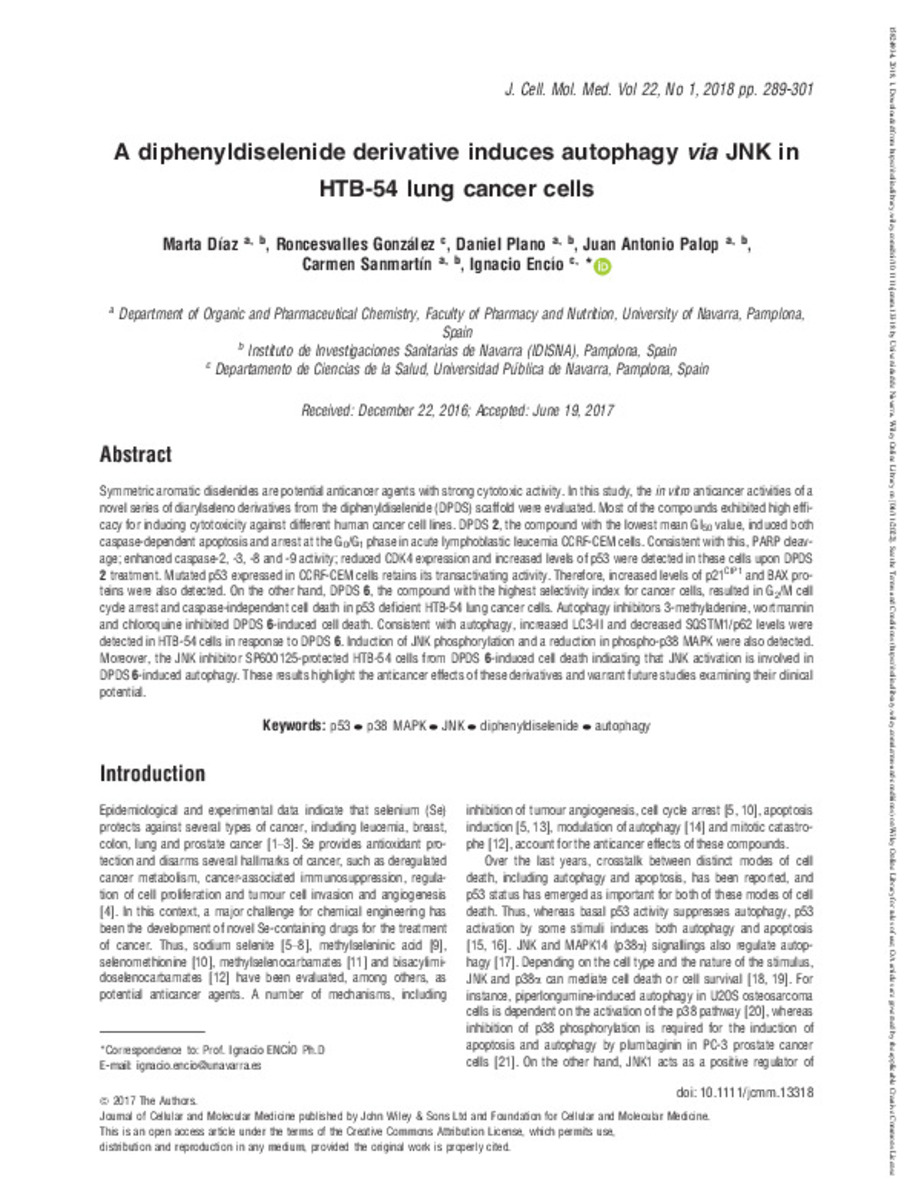Full metadata record
| DC Field | Value | Language |
|---|---|---|
| dc.creator | Diaz, M. (Marta) | - |
| dc.creator | González, R. (Roncesvalles) | - |
| dc.creator | Plano-Amatriain, D. (Daniel) | - |
| dc.creator | Palop-Cubillo, J.A. (Juan Antonio) | - |
| dc.creator | Sanmartin-Grijalba, C. (Carmen) | - |
| dc.creator | Encío, I. (Ignacio) | - |
| dc.date.accessioned | 2022-11-30T07:44:42Z | - |
| dc.date.available | 2022-11-30T07:44:42Z | - |
| dc.date.issued | 2018 | - |
| dc.identifier.citation | Diaz, M. (Marta); González, R. (Roncesvalles); Plano-Amatriain, D. (Daniel); et al. "A diphenyldiselenide derivative induces autophagy via JNK in HTB-54 lung cancer cells". Journal of cellular and molecular medicine (online). 22 (1), 2018, 289 - 301 | es_ES |
| dc.identifier.issn | 1582-4934 | - |
| dc.identifier.uri | https://hdl.handle.net/10171/64738 | - |
| dc.description.abstract | Symmetric aromatic diselenides are potential anticancer agents with strong cytotoxic activity. In this study, the in vitro anticancer activities of a novel series of diarylseleno derivatives from the diphenyldiselenide (DPDS) scaffold were evaluated. Most of the compounds exhibited high efficacy for inducing cytotoxicity against different human cancer cell lines. DPDS 2, the compound with the lowest mean GI50 value, induced both caspase-dependent apoptosis and arrest at the G0/G1 phase in acute lymphoblastic leucemia CCRF-CEM cells. Consistent with this, PARP cleavage; enhanced caspase-2, -3, -8 and -9 activity; reduced CDK4 expression and increased levels of p53 were detected in these cells upon DPDS 2 treatment. Mutated p53 expressed in CCRF-CEM cells retains its transactivating activity. Therefore, increased levels of p21CIP1 and BAX proteins were also detected. On the other hand, DPDS 6, the compound with the highest selectivity index for cancer cells, resulted in G2/M cell cycle arrest and caspase-independent cell death in p53 deficient HTB-54 lung cancer cells. Autophagy inhibitors 3-methyladenine, wortmannin and chloroquine inhibited DPDS 6-induced cell death. Consistent with autophagy, increased LC3-II and decreased SQSTM1/p62 levels were detected in HTB-54 cells in response to DPDS 6. Induction of JNK phosphorylation and a reduction in phospho-p38 MAPK were also detected. Moreover, the JNK inhibitor SP600125-protected HTB-54 cells from DPDS 6-induced cell death indicating that JNK activation is involved in DPDS 6-induced autophagy. These results highlight the anticancer effects of these derivatives and warrant future studies examining their clinical potential. | es_ES |
| dc.description.sponsorship | This work was supported by a grant from the University of Navarra Research Plan (PIUNA 2014–26). M.D. was a fellow from the Asociaci on de Amigos de la Universidad de Navarra. J.A.P., C.S. and I.E. designed the research study. | es_ES |
| dc.language.iso | eng | es_ES |
| dc.publisher | Wiley | es_ES |
| dc.rights | info:eu-repo/semantics/openAccess | es_ES |
| dc.subject | p53 | es_ES |
| dc.subject | p38 MAPK | es_ES |
| dc.subject | JNK | es_ES |
| dc.subject | Diphenyldiselenide | es_ES |
| dc.subject | Autophagy | es_ES |
| dc.title | A diphenyldiselenide derivative induces autophagy via JNK in HTB-54 lung cancer cells | es_ES |
| dc.type | info:eu-repo/semantics/article | es_ES |
| dc.description.note | This is an open access article under the terms of the Creative Commons Attribution License, which permits use, distribution and reproduction in any medium, provided the original work is properly cited. | es_ES |
| dc.identifier.doi | 10.1111/jcmm.13318 | - |
| dadun.citation.endingPage | 301 | es_ES |
| dadun.citation.number | 1 | es_ES |
| dadun.citation.publicationName | Journal of cellular and molecular medicine (online) | es_ES |
| dadun.citation.startingPage | 289 | es_ES |
| dadun.citation.volume | 22 | es_ES |
Files in This Item:
Statistics and impact
Items in Dadun are protected by copyright, with all rights reserved, unless otherwise indicated.






